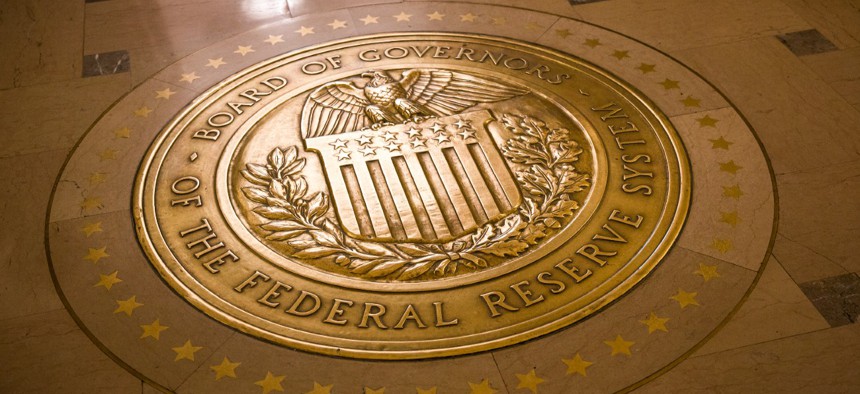
Sens. Elizabeth Warren, D-Mass., and Rick Scott, R-Fla., introduced another bill last month that would also make the Federal Reserve inspector general subject to appointment by the president and confirmation by the Senate. Brooks Kraft/ Getty Images
Another Bipartisan Push for More Financial Transparency and Accountability
“Congress must have a clear understanding of what regulatory and supervisory failures occurred to allow the collapse of both Silicon Valley Bank and Signature Bank,” said one Republican senator.
A bipartisan group of senators is looking to make the Federal Reserve more transparent and accountable through public records requests and its watchdog. This bill was previously introduced at the end of last Congress, but its reintroduction last week comes on the heels of the collapse of Silicon Valley Bank and Signature Bank as well as fears about the stability of the banking system as a whole.
Under the Financial Regulators Transparency Act, the 12 regional Federal Reserve Banks would be subject to the Federal Records Act (for recordkeeping) and the Freedom of Information Act, records requests from members of Congress would be prioritized and its inspector general would be presidentially appointed and Senate confirmed (as opposed to being chosen by the chair of the Board of Governors, which oversees the Federal Reserve System), among other reforms.
“Congress must have a clear understanding of what regulatory and supervisory failures occurred to allow the collapse of both Silicon Valley Bank and Signature Bank,” said Sen. Tom Tillis, R-N.C., ranking member of the Senate Banking, Housing and Urban Affairs Committee’s Financial Institutions and Consumer Protection panel. “It is clear to me the Fed made mistakes and greater transparency is needed to determine what went wrong so we can ensure that it doesn’t happen again.”
Other provisions of the bill include: forbidding the fed regional banks from withholding information requested by members of Congress under FOIA by saying the information is privileged; giving all members of Congress equal ability to obtain ethics-related information from the Fed Board and Reserve Banks, Consumer Financial Protection Bureau, Federal Deposit Insurance Corporation, Office of the Comptroller of the Currency, National Credit Union Administration, Federal Housing Finance Agency; preventing the regional banks from charging members of Congress a fee to process requests; and clarifying that the Federal Reserve IG doesn’t need permission from a regional bank in order to conduct oversight of it.
“Together, these reforms would strengthen congressional oversight of the Fed and other financial regulatory agencies, while still explicitly maintaining the Federal Reserve’s independence on monetary policy issues,” said a press release from the senators.
When asked about the bill, a spokesperson for the Federal Reserve IG said, “consistent with the IG Act, we have the same independence and authorities afforded to all inspectors general to audit and investigate the board.” Additionally, “we have and will continue to provide independent and robust oversight over both the Board and the CFPB,” which it also has jurisdiction to oversee.
The IG, who reports to the Board of Governors and CFPB director, “has an independent reporting responsibility to Congress,” the watchdog’s website reads. “All inspectors general are appointed without regard to their political affiliation and based on their integrity and their ability in accounting, auditing, financial analysis, law, management analysis, public administration, or investigations.”
The Federal Reserve declined to comment on the bill.
The other co-sponsors are Sens. Elizabeth Warren, D-Mass., Mike Rounds, R-S.D., Krysten Sinema, I-Ariz., Bill Hagerty, R-Tenn., Richard Blumenthal, D-Conn., Cynthia Lummis, R-Wyo., Ted Cruz, R-Texas, and J.D. Vance, R-Ohio.
Warren, who played a big role in the creation of the CFPB and chairs the Senate Banking, Housing and Urban Affairs’ economic policy panel, said in a statement “more and more lawmakers are troubled by the Fed's key role in the recent bank failures, and this bipartisan bill underscores the momentum in Congress for enhanced transparency measures to hold Fed officials accountable for their actions.”
She, along with Sen. Rick Scott, R-Fla., introduced another bill last month that would also make the Federal Reserve inspector general subject to appointment by the president and confirmation by the Senate.







